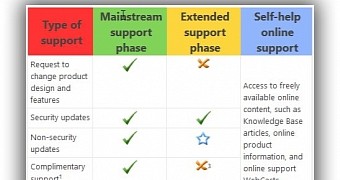After Windows XP in April 2014, another Windows version reaches end of support, this time in a less critical milestone for consumers and companies worldwide.
Windows 7 Service Pack 1 mainstream support officially ends today, while extended support will continue to be offered until January 14, 2020.
So, what does this mean for consumers and businesses? Do they need to upgrade their computers right now, or should they wait until the next deadline to do so?
Basically, the end of mainstream support doesn’t represent a critical milestone for those running Windows 7 Service Pack 1 on their computers, and the table above explains what you’re losing now that extended support is all you get.
In the extended support phase, you are not allowed to request the company to change product design and features and you do not receive complimentary support with license, licensing program or other no-charge support programs.
Should I upgrade?
The short answer would be “no.” The end of mainstream support doesn’t bring any significant change for consumers, but it’s another signal for companies that they should at least start preparing the upgrade to a new operating system, as it’s a well-known fact that such a transition usually takes months, depending on the number of computers in their organization.
Windows 7 is right now the number one desktop operating system with a market share that exceeds 50 percent.
And yet, there’s still hope that Windows 7’s supremacy could at some point come to an end, not necessarily in January 2020, but when Windows 10 and maybe its successors see daylight.
Windows 10 is regarded as a greatly improved version of Windows 8, that also brings elements appealing to Windows 7 users, so it’s only natural to expect that those running Windows 7 right now would at least consider an upgrade.
According to sources, Windows 10 should see daylight later this year, but by that time, expect Windows 7’s market share to continue to grow, especially because those in search of a familiar operating system running well on old hardware too have limited options.

 14 DAY TRIAL //
14 DAY TRIAL //